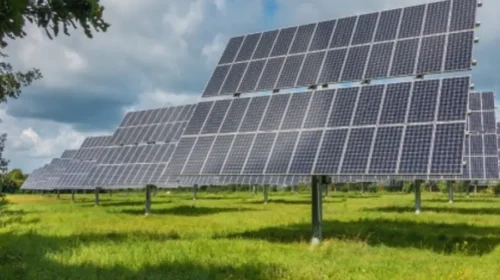China moves to end solar bloodbath, as East Buy chases warehouse club crown

“The issue is not the will. I think the will is there on the part of the government, very clearly. The more pressing issue is the money.”

By Doug Young & Rene Vanguestaine
A massive, state-led intervention to save China’s hemorrhaging solar industry and a nimble company’s ambitious pivot to replicate the wildly successful Western warehouse club model may seem unrelated. Yet both stories reveal the complex forces shaping China’s economy today. One is a tale of industrial overcapacity and a government-forced correction; the other, a story of shifting consumer tastes and a bottom-up search for a winning formula.
For more than a year, China’s solar sector has been a major bloodbath, a sea of red ink where manufacturers sell their products for far less than they cost to produce. This “involution,” or race to the bottom, is fueled by the kind of massive overcapacity that has become a common theme in China. The situation is dire. Daqo (DQ.US; 688303.SHG), a leading maker of polysilicon, recently revealed it spent $7.26 to produce each kilogram of its product in the second quarter, only to sell that same kilogram for just $4.19. To staunch the bleeding, the company is now operating at a mere one-third of its capacity. Daqo’s woes are emblematic of the entire industry.
In response, Beijing has launched yet another campaign to clamp down on cutthroat pricing and shut down older, inefficient production lines. We believe the chances of success this time are probably higher than we would have thought a few months ago. The government is making a great deal of noise, with even President Xi Jinping recently opining on the matter. There are reports on a new initiative that would force the sector to eliminate 30% of its overall capacity, starting with the most obsolete facilities. The reported price tag is a staggering $7 billion, with the government expected to provide about $5 billion in loans or cash injections and top manufacturers covering the rest.
We think the issue is not the will, but the money and the execution. Unlike the fragmented EV sector with its hundreds of players, the solar industry is dominated by a handful of key players who are closely aligned with Beijing’s strategic goals of reducing coal use and meeting its climate targets. These companies have little choice but to pay close attention to what the government wants.
The more pressing issues are logistical. First, it remains to be seen if this plan will materialize into an executable strategy with firm numbers. Then comes the question of who must cut and by how much. While smaller, less profitable players with older technology are expected to be shuttered, that alone won’t account for 30% of China’s existing capacity. The big players are going to have to sacrifice some of their own production. This is further complicated by politics; while it would make business sense to close capacity in Xinjiang to appease U.S. and European concerns over forced labor, we doubt Beijing would allow it, as it would be viewed as caving to international pressure. Finally, the industry must still deal with a large and persistent inventory overhang. In summary, we think a correction will happen, but the key questions are how quickly it can be implemented and who will ultimately bear the cost.
An online upstart aims to be the Sam’s Club of China
At the other end of the business spectrum is East Buy (1797.HK), a company that has been through several iterations. It began as an online educator, Koolearn, before a government crackdown forced it to shut down that business. It then pivoted to livestreaming e-commerce, only to stumble after a public clash with its star host. Now, the company is trying again, this time with a plan to become the “Sam’s Club of China” by selling its own private-label goods — mostly food — through an online, membership-style format.
We find this move intriguing. First Costco (COST.US ), and then Walmart’s (WMT.US) Sam’s Club, found immense success in China, with the latter almost single-handedly reviving Walmart’s struggling operations there. Yet, no domestic company has managed to successfully replicate this warehouse-style discount model. The question is whether East Buy, which for now remains an online-only presence, can be the first.
We think this is a valiant effort to build a business that is not dependent on a small number of online influencers. For a change, the company is entering a space where it will have little to no competition — at least before it really proves successful, after which we would expect dozens of copycats to emerge, because this is China, after all. The membership model itself has huge advantages, providing a steady and substantial stream of recurring revenue from fees. The explosive success of Costco’s first store in Shanghai a few years ago is indicative of the real potential for this model, which offers Chinese consumers the novelty of buying in bulk.
Of course, everything will come down to execution. The core attraction for shoppers at both Costco and Sam’s Club is the powerful belief, and reality, that they are getting a much better deal. This is achieved through bulk purchasing, hyper-efficient sourcing, and a strong private-label program that offers savings over traditional brands. In China’s current consumer climate, where it seems every shopper wants to pay less for everything tomorrow than they do today, this value proposition is more powerful than ever. While there is also an element of “destination shopping” that makes a trip to these stores an exciting event, that novelty will likely fade as the stores become more common. The enduring appeal lies in the price.
About China Inc
China Inc by Bamboo Works discusses the latest developments on Chinese companies listed in Hong Kong and the United States to drive informed decision-making for investors and others interested in this dynamic group of companies.
Subscribe to China Inc on your favorite app:








